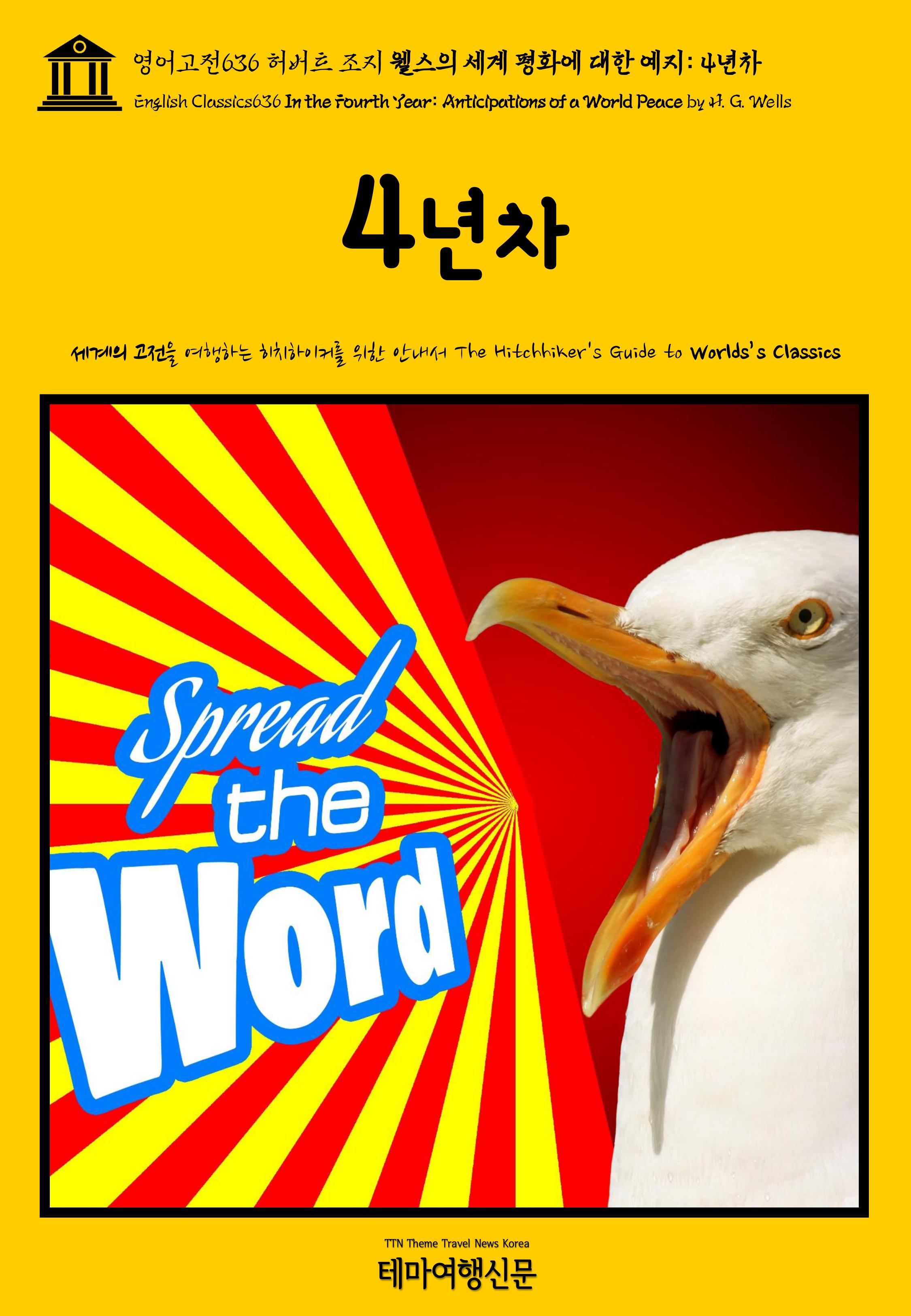▶ 세계 평화에 대한 예지: 4년차(In the Fourth Year: Anticipations of a World Peace by H. G. Wells)(1918)는 허버트 조지 웰스(H. G. Wells)(1866~1946)의 에세이 모음집(essays)입니다. 제1차 세계 대전(World War I)(1914~1918) 이후 전후 정치(post-war politics)에 대한 제안과 항구적인 평화를 위한 국제 연맹(League of Nations) 혹은 자유 국가 연맹(League of Free Nations)의 설립에 대한 아이디어가 담겨 있습니다. 작가가 말하는 국제 연맹은 모든 국제 분쟁에 대해 판결할 수 있는 권한(We must begin by delegating powers), 전 세계 모든 국가의 군사, 해군 및 항공 장비를 정의하고 제한할 수 있는 권한(The preservation of the world-peace rests with the great powers and with the great powers alone.)을 가진 조직을 의미합니다. 또한 영국의 대의민주주의(delegate democracy)는 실패하였으며, 정당 정치를 극복하고 유능한 개인을 선택하기 위한 비례 대표제(Proportional Representation)를 촉구하였습니다. 테마여행신문 TTN Korea 영어고전(English Classics)과 함께 어제도, 오늘도, 내일도 멋진 문학여행을! B
▶ In those days, moreover, we said this is the “war to end war,” and we still did not know clearly how. We thought in terms of treaties and alliances. It is largely the detachment and practical genius of the great English-speaking nation across the Atlantic that has carried the world on beyond and replaced that phrase by the phrase, “The League of Nations,” a phrase suggesting plainly the organization of a sufficient instrument by which war may be ended for ever. In 1913 talk of a World League of Nations would have seemed, to the extremest pitch, “Utopian.”
더욱이 당시에는 이것이 '종전 전쟁'이라고 말했지만, 아직까지도 어떻게 되는지 명확하게 알지 못했습니다. 우리는 조약과 동맹의 관점에서 생각했습니다. 대서양을 가로질러 대서양을 건너는 위대한 영어권 국가의 초연함과 실용적인 천재성이 세계를 넘어 세계를 확장하고 그 문구를 충분한 도구의 조직을 명백하게 암시하는 문구인 "국제 연맹"이라는 문구로 대체했습니다. 이로써 전쟁은 영원히 끝날 수 있습니다. 1913년에 세계 국제 연맹(World League of Nations)에 대한 이야기는 가장 극단적으로 말하면 "유토피아적"으로 보였을 것입니다.
▶ No one can vie with me in my appreciation of the civilization of Switzerland, Sweden, or Holland, but the plain fact of the case is that such powers are absolutely incapable of uttering an effective protest against war. Far less so are your Haytis and Liberias. The preservation of the world-peace rests with the great powers and with the great powers alone. If they have the will for peace, it is peace. If they have not, it is conflict. The four powers I have named can now, if they see fit, dictate the peace of the world for ever.
스위스, 스웨덴, 네덜란드의 문명에 대한 나의 평가에서 나와 경쟁할 사람은 없지만 분명한 사실은 그러한 열강이 전쟁에 대해 효과적인 항의를 할 수 없다는 것입니다. 헤이티스(Haytis)와 라이베리아스(Liberias)는 훨씬 적습니다. 세계 평화의 보존은 강대국과 강대국에게만 달려 있습니다. 그들에게 평화의 의지가 있다면 그것은 평화입니다. 그들이 없다면 그것은 갈등입니다. 내가 명명한 4개의 힘은 이제 적절하다고 판단되면 세계의 평화를 영원히 지배할 수 있습니다.
▶ Now, there are two chief arguments, running one into the other, for the necessity of merging our existing sovereignties into a greater and, if possible, a world-wide league. The first is the present geographical impossibility of nearly all the existing European states and empires; and the second is the steadily increasing disproportion between the tortures and destructions inflicted by modern warfare and any possible advantages that may arise from it. Underlying both arguments is the fact that modern developments of mechanical science have brought the nations of Europe together into too close a proximity. This present war, more than anything else, is a violent struggle between old political ideas and new antagonistic conditions.
이제 우리의 기존 주권을 더 크고 가능하다면 세계적인 리그로 통합해야 할 필요성에 대한 두 가지 주요 주장이 있습니다. 첫 번째는 현존하는 거의 모든 유럽 국가와 제국이 현재 지리적으로 불가능하다는 점입니다. 두 번째는 현대 전쟁이 가하는 고문과 파괴와 그로 인해 발생할 수 있는 모든 가능한 이점 사이의 불균형이 꾸준히 증가하고 있다는 것입니다. 두 주장의 근간에는 현대 기계 과학의 발전으로 인해 유럽 국가들이 너무 가까워졌다는 사실이 있습니다. 이 현재의 전쟁은 무엇보다 오래된 정치사상과 새로운 적대적 조건 사이의 격렬한 투쟁입니다.
▶ I have made it here in order to render clear first, that what we moderns mean by democracy is not what the Greeks meant at all, that is to say, direct government by the assembly of all the citizens, and secondly and more important, that the word “democracy” is being used very largely in current discussion, so that it is impossible to say in any particular case whether the intention is Class I.(2) or Class II.(1), and that we have to make up our minds whether we mean, if I may coin two phrases, “delegate democracy” or “selective democracy,” or some definite combination of these two, when we talk about “democracy,” before we can get on much beyond a generous gesture of equality and enfranchisement towards our brother man. The word is being used, in fact, confusingly for these two quite widely different things.
저는 첫째, 민주주의가 의미하는 것이 그리스인들이 의미하는 것이 아니라는 것을 분명히 하기 위해 이 자리를 만들었습니다. 즉, 모든 시민들의 집회에 의한 직접 정부, 그리고 둘째, 그리고 더 중요한 것은 "민주주의"라는 단어가 현재의 논의에서 매우 크게 사용되고 있기 때문에, 그 어떤 부분에서도 말할 수 없다는 것입니다. 그 의도가 Class I. (2)인지 Class II.(1)인지, 그리고 우리가 대의민주주의(delegate democracy)인지 비례대표제(selective democracy)인지, 아니면 이 두 개의 확실한 조합을 의미하는지, 우리가 민주주의(democracy)에 대해 이야기할 때, 우리가 평등과 특권의 관대한 몸짓을 훨씬 뛰어넘기 전에 우리는 결정을 내려야 합니다. 우리 형제를 향한 멘트입니다. 이 단어는 사실 이 두 가지에 대해 혼동스럽게 사용되고 있습니다.






